Femise 2017 Annual Conference on “Migration and Refugees’ Crisis in the EU-Med: Dawn of an Era of Shared Responsibility?”
Reports of the Plenary Sessions
First Plenary: Impact of the Refugees’ Crisis on Neighbouring Southern countries
Several millions of Syrians have fled their country since 2011 and the beginning of the war. Neighboring riparian states are the destination for the vast majority of them, with Lebanon at the forefront. What will the economic impact of this Syrian diaspora be? And will the refugees return to their country once peace is restored? These are among the questions that have been put at the beginning of this first plenary session of the FEMISE annual Conference (Casablanca, 29-30 April, 2017)

Osama Kadi, FEMISE conference 2017
Devastated by the war that began in March 2011, Syria has lost more than half of its population in only six years. Out of the country’s 25 million inhabitants on the eve of the conflict, 15 million have left the country or have been killed, imprisoned or disabled. “Almost 20,000 engineers left in the first year of the war,” said Osama Kadi, president of the Syrian Economic Task Force (SETF) in his opening statement at the first plenary session. Syrians did not choose to leave their homeland. It was the war that forced them to seek refuge in neighboring countries and cross the Mediterranean risking their lives. As a result, 50 000 people have died drowning since 2011 in makeshift boats trying to escape (presentation available here).
The country is deeply fragmented and the economy lost its capital and human resources. Living conditions are devastating: more than 85% of the remaining population live under the poverty line, most children are out of schools, life expectancy has dropped dramatically to 56 years with no easy access to health care (ratio of doctors to persons is less than is 1:4000) and more than two million houses have been destroyed. Most energy resources have been either damaged or taken over by islamist groups.
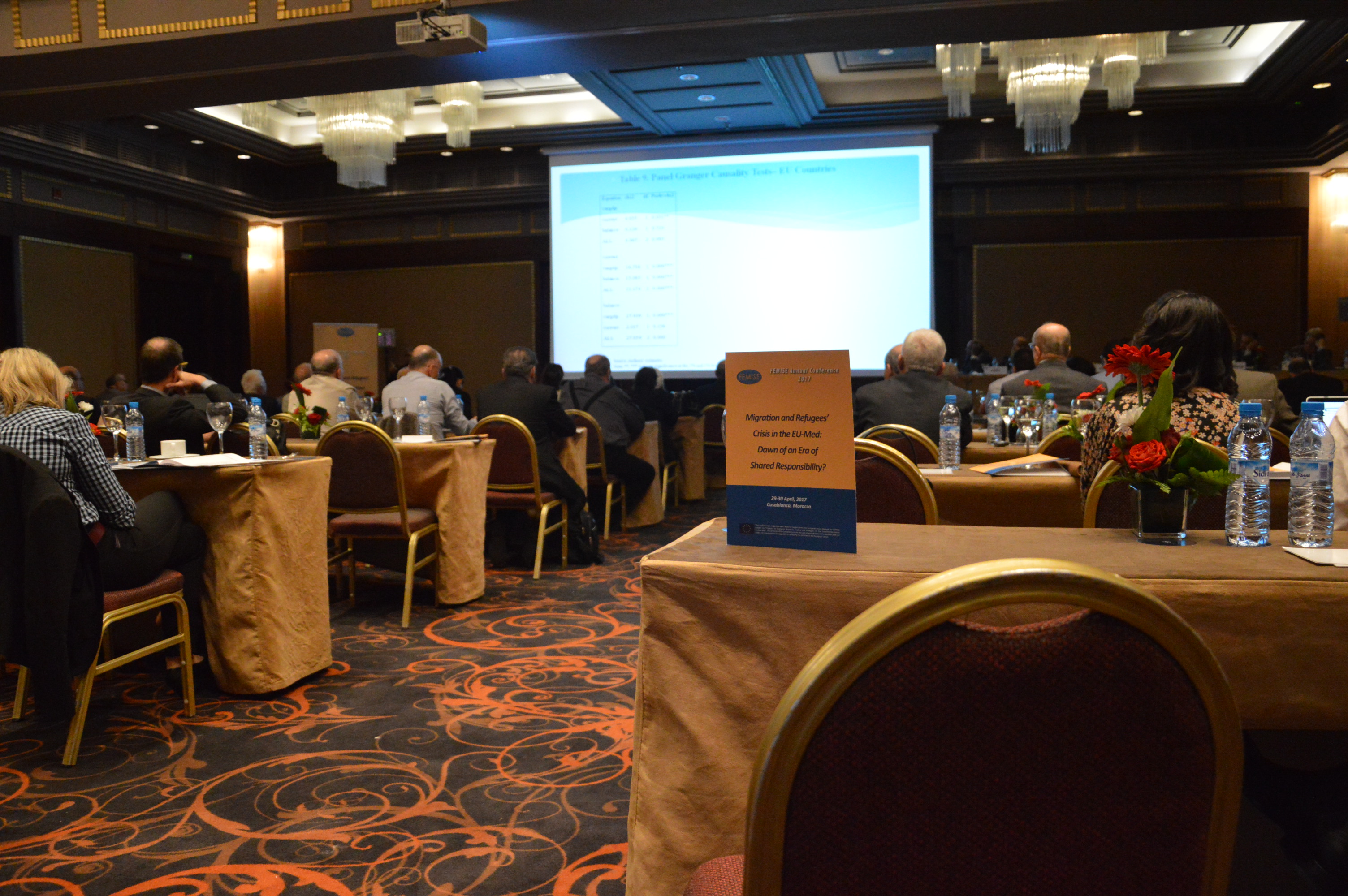
FEMISE conference 2017, Casablanca
However, Mr. Kadi sends a message of hope about post-conflict reconstruction. He argues that security, justice and reconciliation, social and economic well-being and governance and participation. Amidst huge challenges, and depending on how the conflict will be resolved, he suggested four sectors that could achieve quick returns: energy sector, agriculture and labor intensive industries. He provided some of his insights about the short and long run reforms plans, inspired by the “Marshall Plan” which reconstructed western Europe after the WWII.
Refugee status to join the formal sector
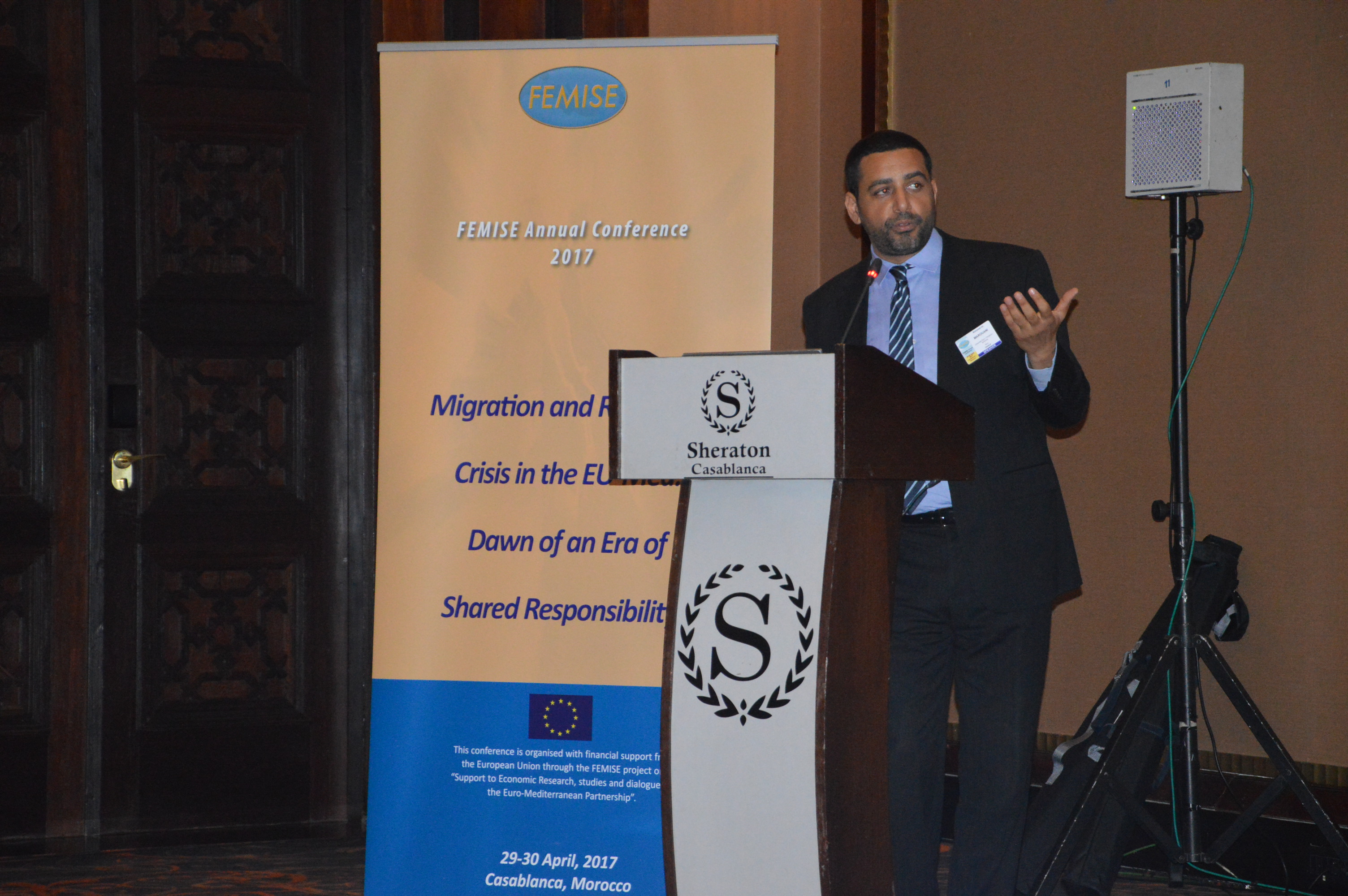
Mohamed Ali Marouani, FEMISE conference 2017
Complementing the picture, Mohamed Ali Marouani, Professor of Economics at the University Paris 1 Panthéon-Sorbonne highlights: “We are too focused on the humanitarian aspects and not enough on the economic stakes. In Lebanon, Syrian refugees live in poor areas characterized by high rates of unemployment. How can we improve their quality of life? If refugees fail to be part of the economy, they will remain in the informal sector and will not be able to generate trade, “analyzes Mohamed Ali Marouani, who advocated for their integration into the formal labor market during his speech about the economic impact of the Syrian crisis on the neighbouring country: Lebanon (presentation available here).
Lebanon is on the front line. Syrian refugees now represent about 30% of the Lebanese population. This is the highest rate of Syrian refugees in the world. By way of comparison, they represent only 3% of the Turkish population. The massive influx of 1.2 million Syrians considerably weighs on the Lebanese economy. The country has to face a 20% drop in its exports and an important rise in the unemployment rate. His analysis focuses on four possible impacts : first the impact of sharing border with Syria as a country in conflict (which will have huge impact on its trade and economy), second the impact of huge influx of refugees that entered Lebanon with particular need to access the labour markets, third the impact of an extreme case scenario of aid stopping and hence causing complete reliance on income generated from labour and fourth, the positive impact of increasing investment through foreign aid. His analysis showed that costs of lower trade (and tourism) in Lebanon are high given the importance of these sectors for the Lebanese economy. The flows of refugees have a negative impact on unemployment (particularly for the lowest segments of the Lebanese workforce). Global growth is higher, but if we take into account the refugees, growth per capital is lower. This is mainly due to the negative impact of the shocks on investments.

Ibrahim Ahmed ElBadawi, FEMISE conference 2017
While Turkey refuses to give Syrians refugee status, depriving them of Turkish citizenship, Egypt and Sudan have shown an exemplary attitude. “Syrians can have a job in Egypt. Their integration is a model to be studied, “suggests Ibrahim Ahmed Elbadawi, president of Femise and Managic Director of the Economic Research Forum in Cairo. “Syrians feel safe in Egypt and develop trade relations. It remains to be seen whether at the end of the war, they can return to Syria, “stresses Osama Kadi. “The heritage they enjoy in the host countries will determine their final choice. They lost everything in Syria.

Raed Safadi, FEMISE conference 2017
How can we help them regain the motivation to rebuild their country in ruins, states Raed Safadi during his presentation entitled ” Impact of the refugees on Neighbors: the Good, the Not so Good .. and the Bad “. He advocates the fact that the combined population of Jordan ,Turkey and Lebanon (neighbouring countries) is 94 mn with a GDP of $900; while the population in the EU is 500 mn with a GDP of $18.4 trillion and the population is the USA is 319 mn with a GDP of $17.4 trillion. He explains that the impact of the refugees could be a boon if they fill demographic gaps, integrate in the labour market and become productive and bring bilateral trade and investment; and they could be a burden if they strain on public and private services, cause overcrowding and increase societal strife. The impact of the Syrian conflict has caused greater macroeconomic challenges in the neighbouring countries than the influx of Syrian refugees, such as blocked export channels and destinations, tourism, regional insecurity. However, there are some on-going positive impacts of those refugees, in Turkey 26% of newly established business are Syrians. Dr. Safadi stressed the need to consider both humanitarian and development assistance (presentation available here).
Second Session: Unifying the Mediterranean vision of migration to the benefit of migration and refugees
While the first plenary session highlighted a rather disparate management of the refugee influx by host countries, the second plenary session of the Femise conference (29th of April 2017 in Casablanca) focused on finding concrete solutions to bring a Common vision. Too many divergences exist between the perception and actual management of refugees in the north and south of the Mediterranean, hindering the establishment of a solidarity chain. The phenomenon being perceived as a threat for some and an opportunity for others …
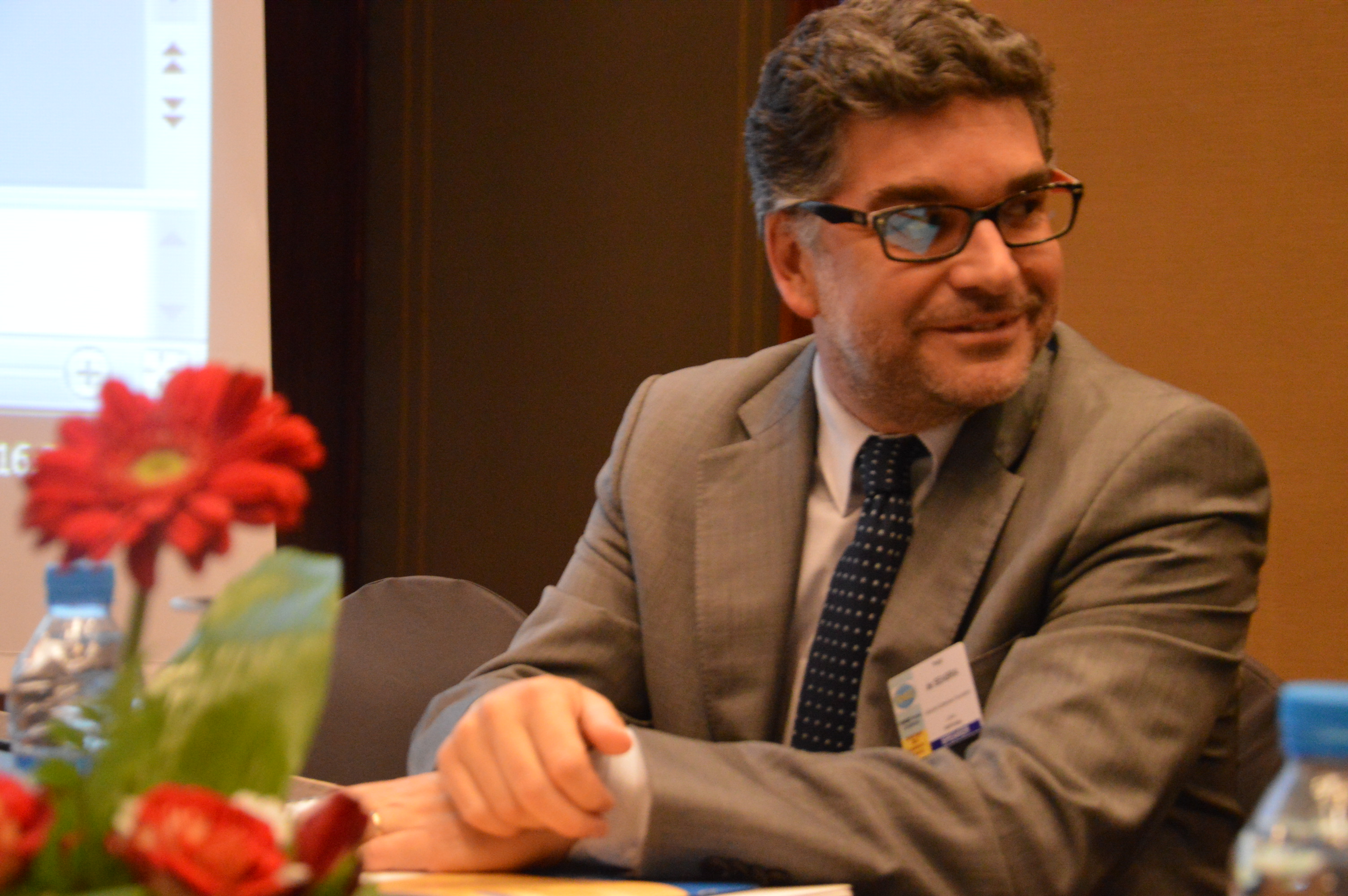
Hugo de Seabra, FEMISE conference 2017
Economic immigrants, political refugees and free movement of individuals … about 6,000 immigrants struck daily at the gates of Europe in 2015, during the crisis peak. Given the magnitude of the phenomenon, EU states were improvising by bringing an empirical response. “The welfare state has exacerbated divisions in Europe. We must build a common ground and develop an inclusive approach, “argues Hugo de Seabra of the Calouste Gulbenkian Foundation in Portugal, at the initiative of the November 2016 Lisbon Summit on” Improving responses in Europe to the refugee crisis “.He adds that unifying a vision for Europe will require some strategic directions to: create the political will to develop a forward-looking EU Strategy towards migration; develop a coherent and fair mechanism to manage migration flows, to promote work-focused integration that strengthens social belonging and to mobilise the whole society to promote inclusivity. Each of these directions will require well-designed policies that he elaborated in his speech (presentation available here).
Harmonizing the granting of asylum in Europe
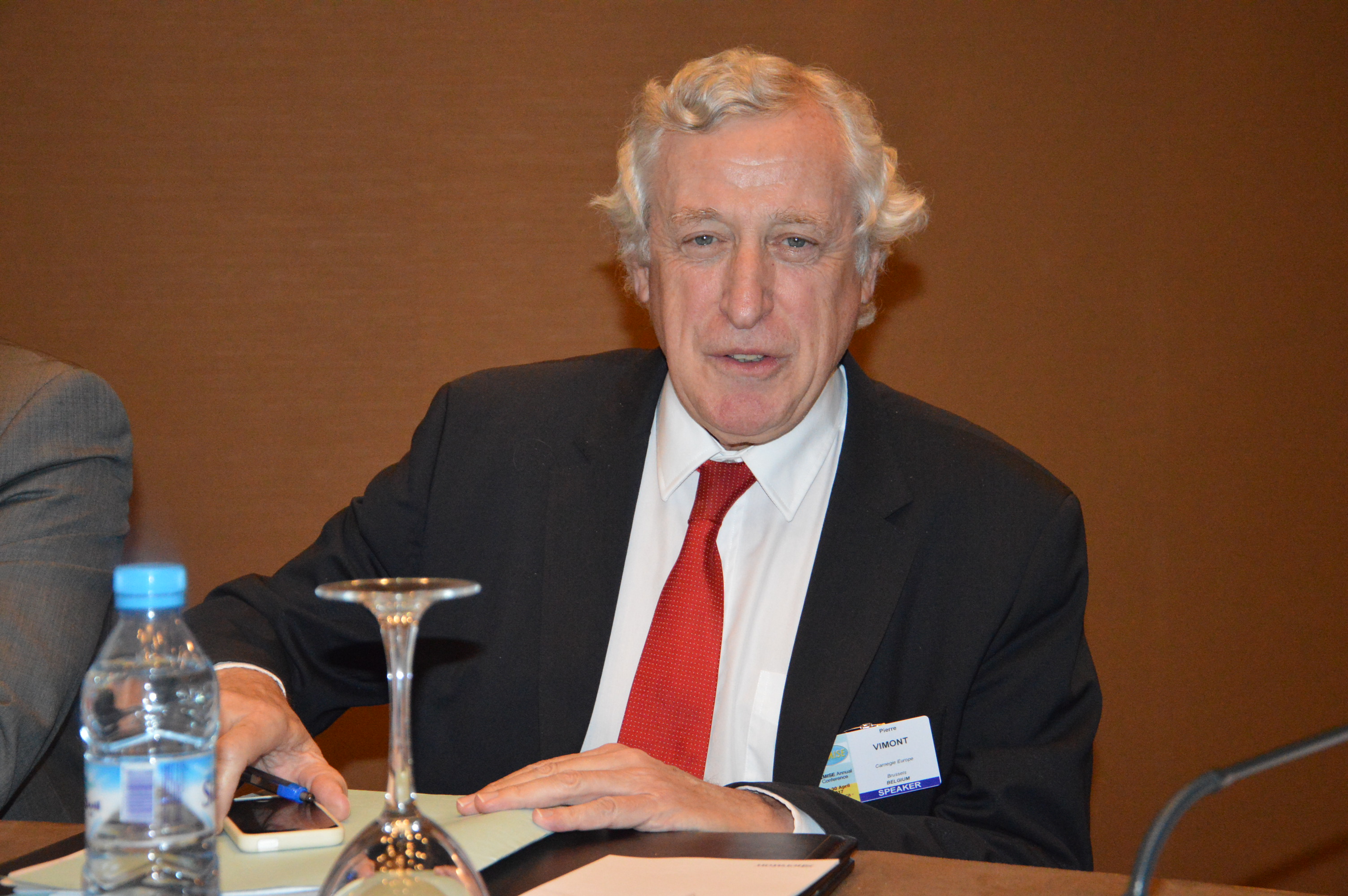
Pierre Vimont, FEMISE conference 2017
“A real substantive reflection must be carried out on burden-sharing. We must adopt a genuine immigration policy with harmonized rules, in particular on the time-limits for granting asylum between the different European countries “, suggests Pierre Vimont, Senior Fellow at Carnegie Europe. The refugee crisis has divided Europe, exacerbating tensions and contributing to the rise of populism. It was not until 2015 that Brussels decided to develop an immigration strategy.
“Europe sought regaining control by closing its borders all the while trying to convince the countries of the south to keep immigrants on their soil in return for economic and financial support,” analyzes Pierre Vimont. He added: “Europe would like to duplicate the agreement that was reached with Turkey to Libya, something which is impossible given the political and social situation”. He suggests several lines of work: defining a rigorous policy, organizing a first stage in Africa allowing to legally enter Europe and increasing financial support to Lebanon, Turkey and Jordan.
Nevertheless, has Europe not amplified the phenomenon? “About 70% of the 6 million Syrian refugees remained in the region. Europe has received only 1.3 million refugees. Of the 770,000 asylum-right beneficiaries in 2016, 450,000 are in Germany and 35,000 in France, “states Senén Florensa, executive president of IEMED in Barcelona.
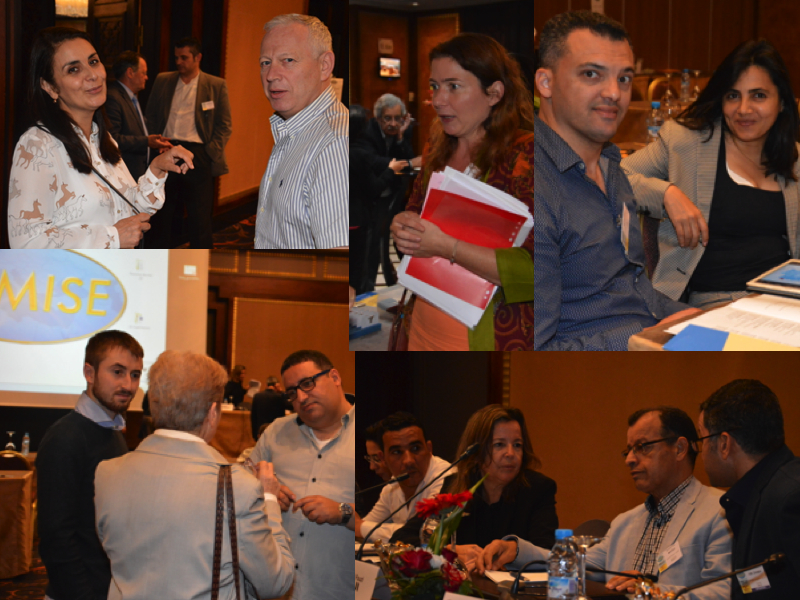
FEMISE researchers debating, FEMISE conference 2017
Over time, since the beginning of the crisis in 2011, new roads have been opened, displaced or closed. By 2016, 55% of refugees were transiting through Greece and 45% through Italy.
A land of economic immigration, Spain ceased to be attractive when it was struck by the crisis with a saturated labor market. From a transit country, Morocco has seen its status change to become a host country. He highlights the fact that there are overlapping strategies in terms of managing Migration in the EU-Med region: from the EU-27 strategy, the 5+5 the union for the Mediterranean, the ENPI and the Euro-African conference on Migration and development which complicates the picture. He concludes by stating that from “more development for less migration” to “ better migration for more development” and that the migration policies should not be disconnected from development policies.
Third Session — What actions are still needed to Face the Refugees Crisis ?
The Syrian conflict is the most important humanitarian challenge. It marks an exodus of more than five million Syrians which settled in Egypt, Iraq, Lebanon, Jordan and Turkey. The 13.5 million who chose to stay require emergency assistance. The United Nations, through the Office of the United Nations High Commissioner for Refugees (UNHCR) and the International Organization for Migration (IOM), are trying to provide concrete answers by helping people in distress. Providing immediate actions while anticipating peace, reconstruction and the return of refugees … Speakers at the last session of the Femise conference delivered their vision for the future.
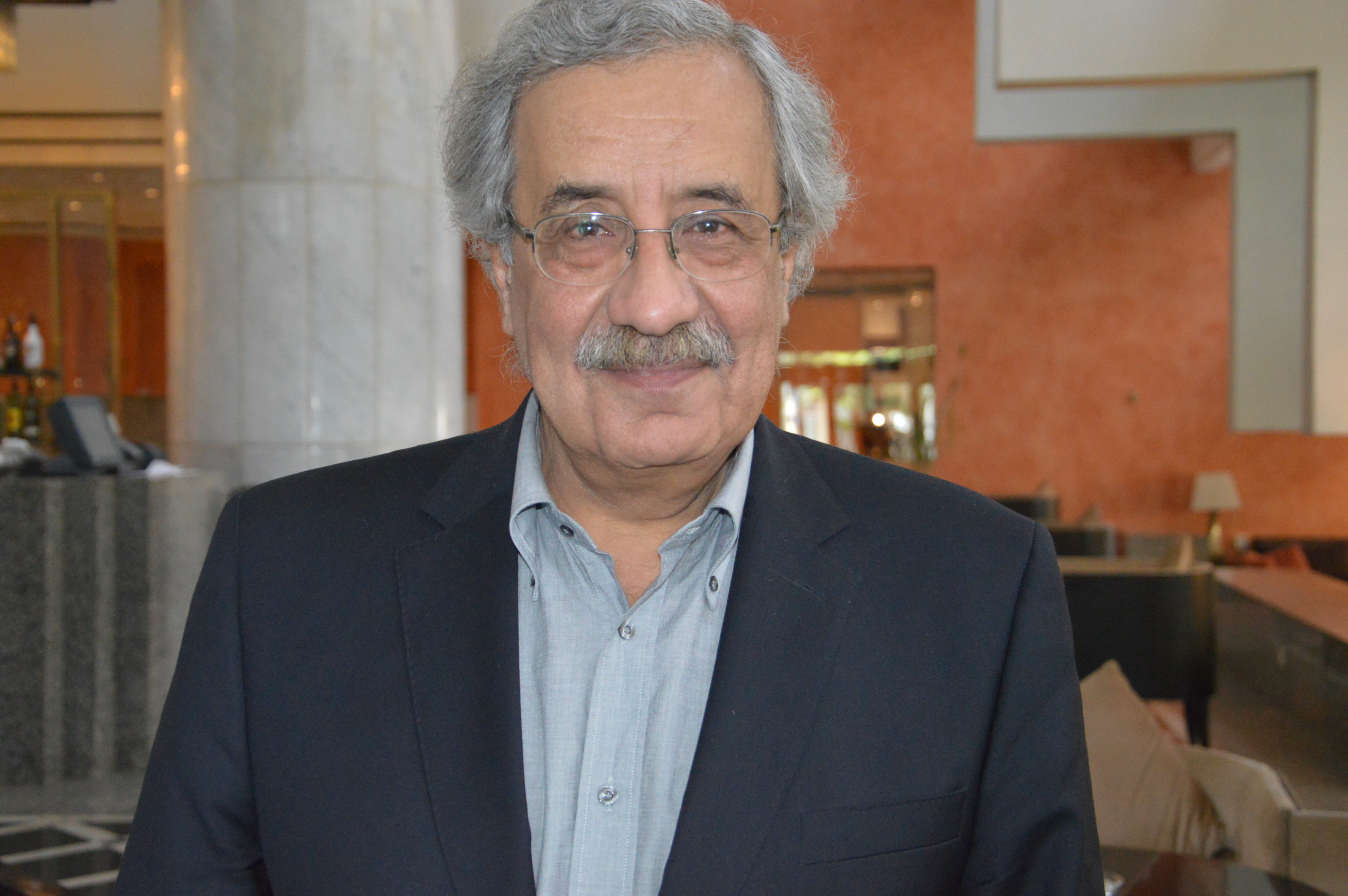
Charbel Nahas, FEMISE conference 2017
At the end of the war, economists are considering several scenarios. “Civil war has irreversible effects. Should Syrian refugees be fully or partially integrated into host countries? Should we organize their repatriation? “queried Charbel Nahas, economist and former labor minister in Lebanon. Wear, weariness and even trivialization of a conflict that drags on … As the civil war in Syria enters its seventh year, aid is becoming scarce. To date, only US $ 7 million has been received out of the USD 200 million needed to build shelters and provide non-food aid.
A civil war is both demobilization and destruction of resource stocks. The Syrian population is suddenly in surplus. Its migration is a predictable effect. The balance between the population stock and the capital stock has been broken in Lebanon. Behind the complementarity or substitutability of Lebanese workers (and other residents) and Syrians lies the question of the adjustment variable: adaptation of labour, of the economy or society. Considerable choices arise: to integrate the Syrians totally, partially, with differentiated statuses, to organize their exit … In each case, it is the socio-political institutional model that must be redefined and the regional context with it. Contrary to pure economic theory, country-size matters, but in terms of relative strength ratio. The movement of goods is not equivalent to the movement of factors, especially of men and of natural resources. If there were to be a common vision, it should be clearly political. FEMISE can undoubtedly play a role. Lebanon, for its misfortune experienced civil war and reconstruction before Syria. The Lebanese experience, because it presents a case of extreme adaptation, must imperatively be taken into account.
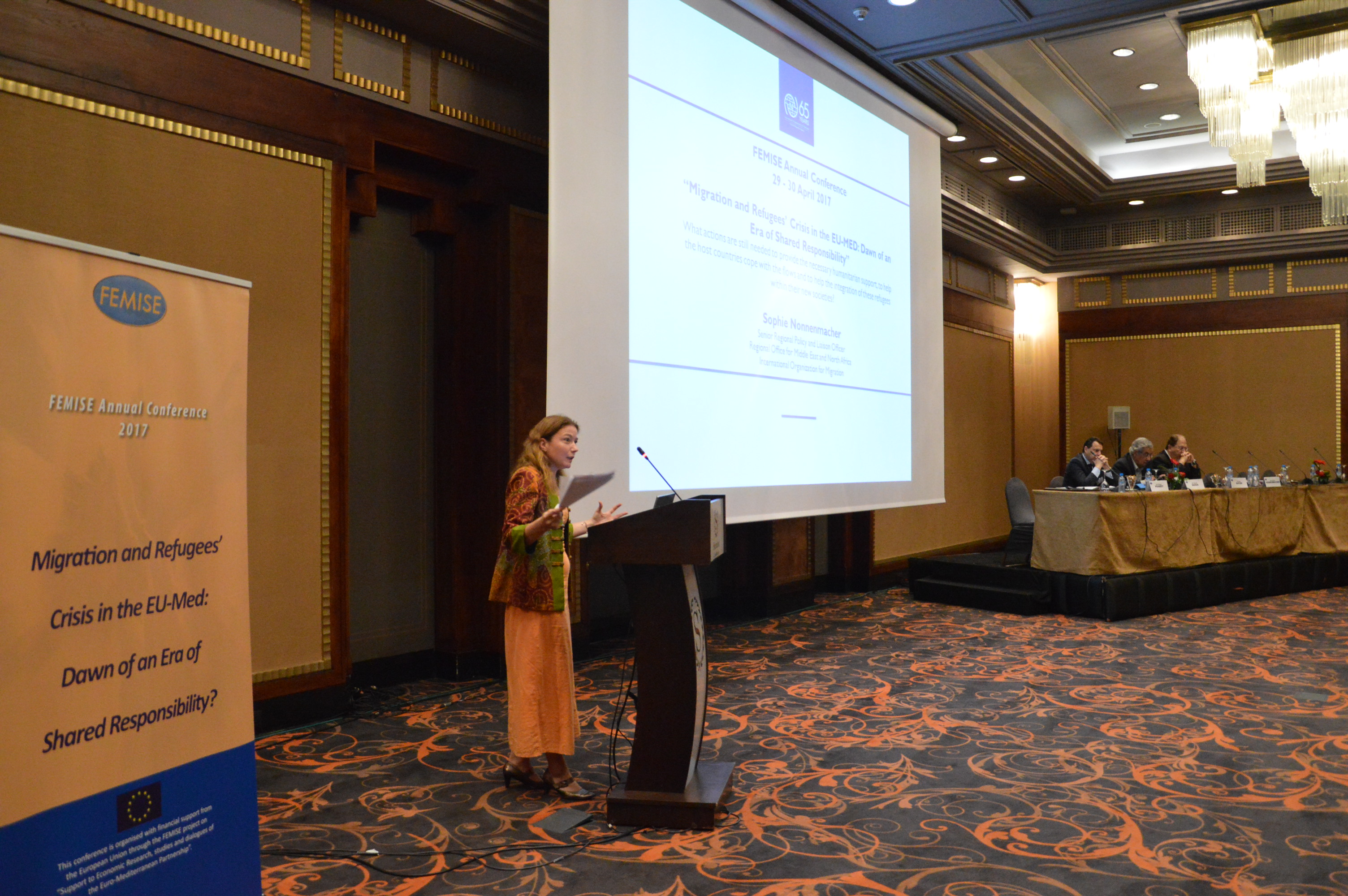
Sophie Nennemacher, FEMISE conference 2017
“During the New York summit in September 2016, countries made concrete financial commitments to support countries in crisis. By 2018, member States also pledged to adopt a global pact for safe, orderly and regular migration. However, this summit was a failure. We are witnesing financial disinterest among States in mobilizing funds for refugees. Thus, UNHCR is launching a new appeal and is trying to re-incite countries to support refugees, “says Sophie Nennemacher, IOM’s regional migration policy officer. She also adds that greater coherence between humanitarian action and development planning to build a resilience community is required (presentation available here).
However, texts protecting migrants in situations of vulnerability do exist. “The United Nations convention on migrants has been scarcely ratified because it gives migrants a lot of rights,” says the migration expert. She describes the vulnerability of the refugees whom routinely fit the decision of a population “left behind”. She provides some details about the efforts of the IOM on this front and their “displacement Tracking matrix” to follow up on the movements of the displaced.
Following the summits of New York and Malta, Kampala will be hosting a summit organized by the African Union in mid-May.
Post-war scenarios
At the end of September, governments, civil society representatives and the private sector will also meet in Cairo to try to reach a consensus and move forward on this issue. “States are called upon to put forward their ideas in order to defend the cause of migrants, to combat human trafficking, to open up legal channels for immigration and to establish lines of cooperation”, adds Sophie Nennemacher. The IOM representative pointed out that tools to monitor migrants’ movements and to assess the needs of populations (refugee camp management, social and psychosocial assistance) do in fact exist. The expert also recalled the multiplier effect of aid on consumption and its stimulating effect on the economy.
Philippe Poinsot, UN coordinator and UNDP representative in Morocco, cites the example of the Shereefian kingdom: “Hospitality is deeply rooted in the Muslim world. Refugees enjoy the same rights as Moroccans “.
For a photo album of the Conference, please click here
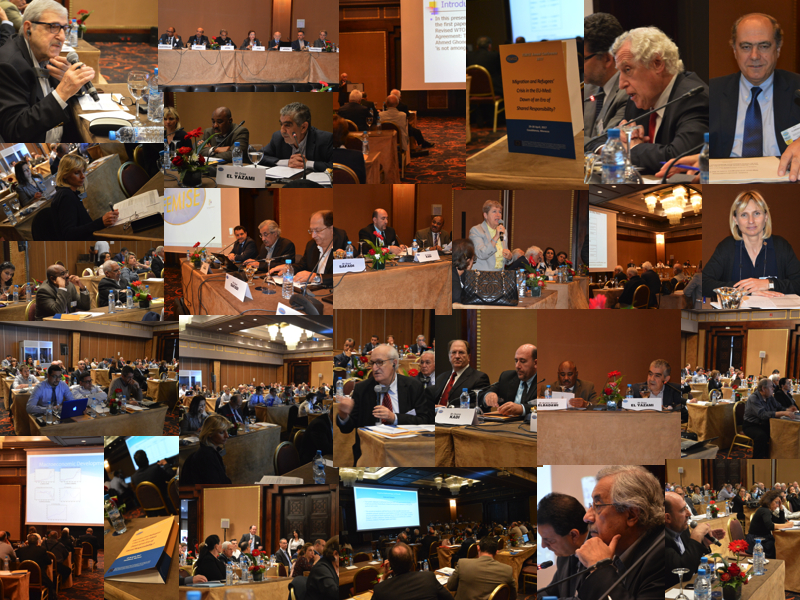
Debates, FEMISE Conference 2017, Casablanca
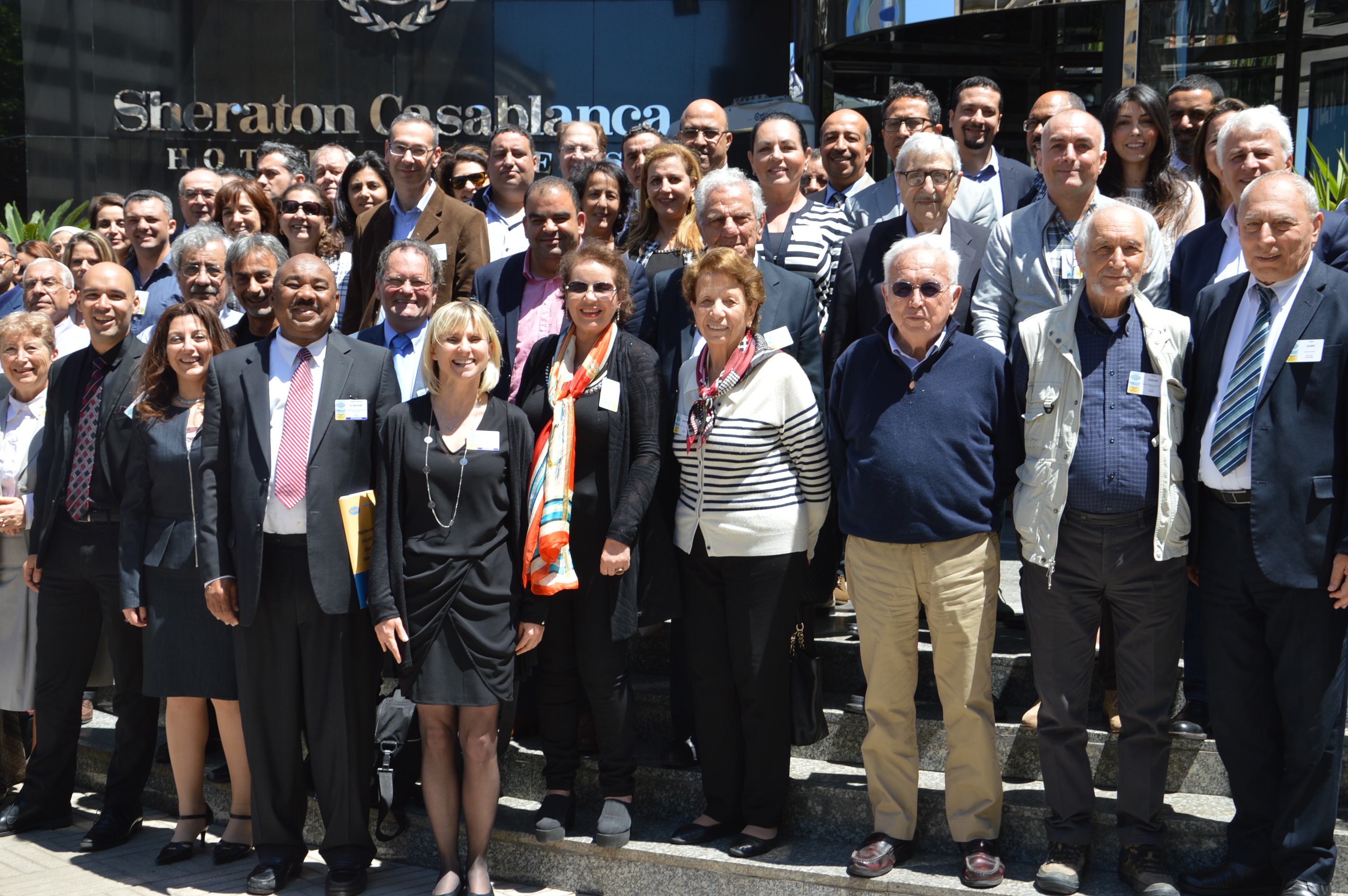
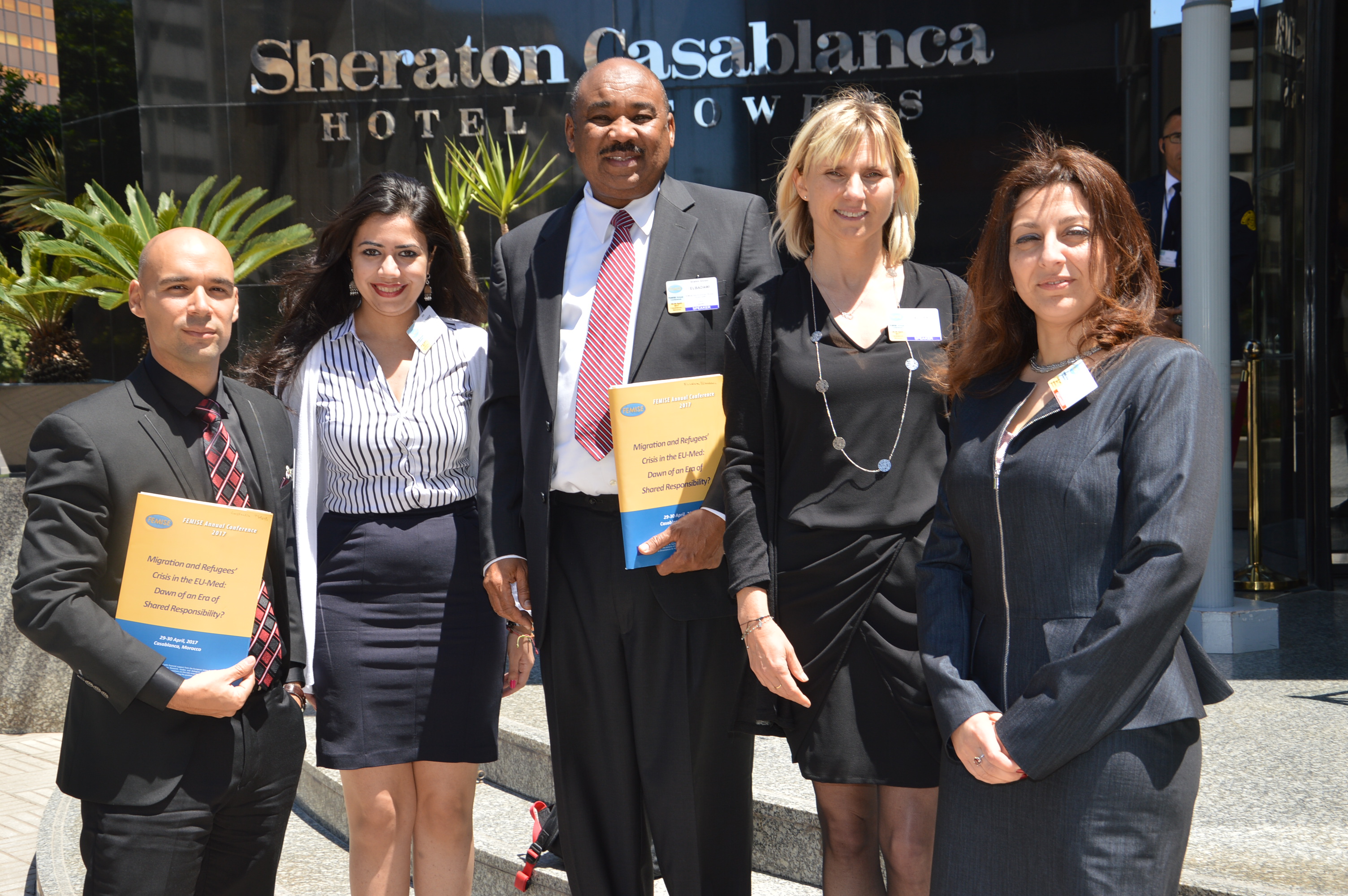
From left to right: Constantin Tsakas, Jala Youssef, Ibrahim ElBadawi, Patricia Augier, Maryse Louis
![]() This event received financial support from the European Union through the FEMISE project on “Support to Economic Research, studies and dialogues of the Euro-Mediterranean Partnership”. Any views expressed in this seminar are the sole responsibility of the speakers.
This event received financial support from the European Union through the FEMISE project on “Support to Economic Research, studies and dialogues of the Euro-Mediterranean Partnership”. Any views expressed in this seminar are the sole responsibility of the speakers.



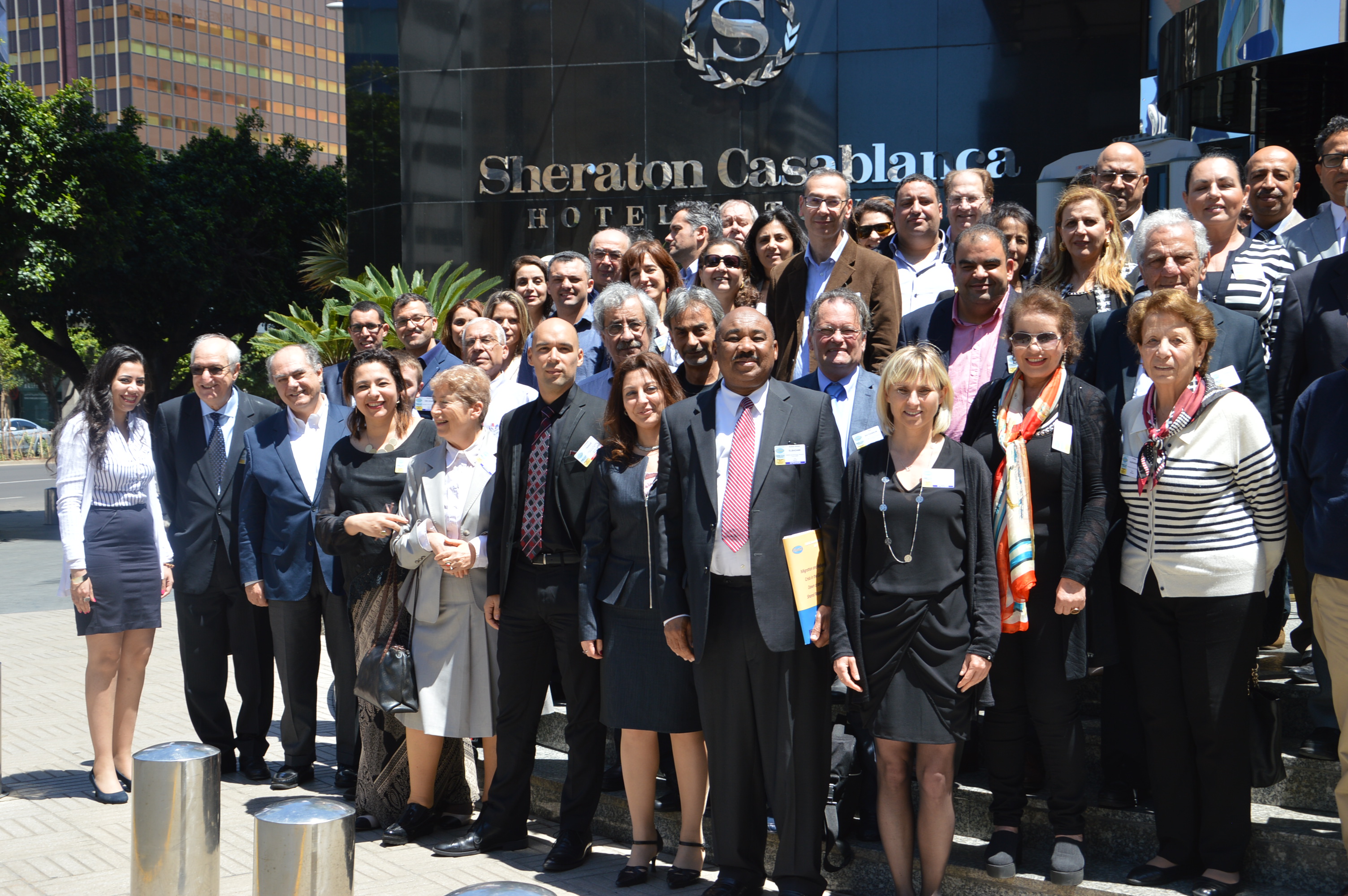
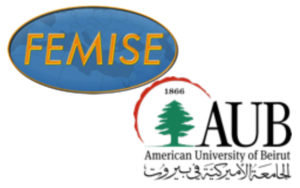 FEMISE is pleased to announce that its next Policy Seminar will be on the theme of “Unlocking the Potential of the Private Sector in South Med Countries” and will take place during the 5th of December 2016, in Beirut, Lebanon. The seminar is organised in collaboration with our partners, the Institute of Financial Economics, at the American University of Beirut (AUB).
FEMISE is pleased to announce that its next Policy Seminar will be on the theme of “Unlocking the Potential of the Private Sector in South Med Countries” and will take place during the 5th of December 2016, in Beirut, Lebanon. The seminar is organised in collaboration with our partners, the Institute of Financial Economics, at the American University of Beirut (AUB).